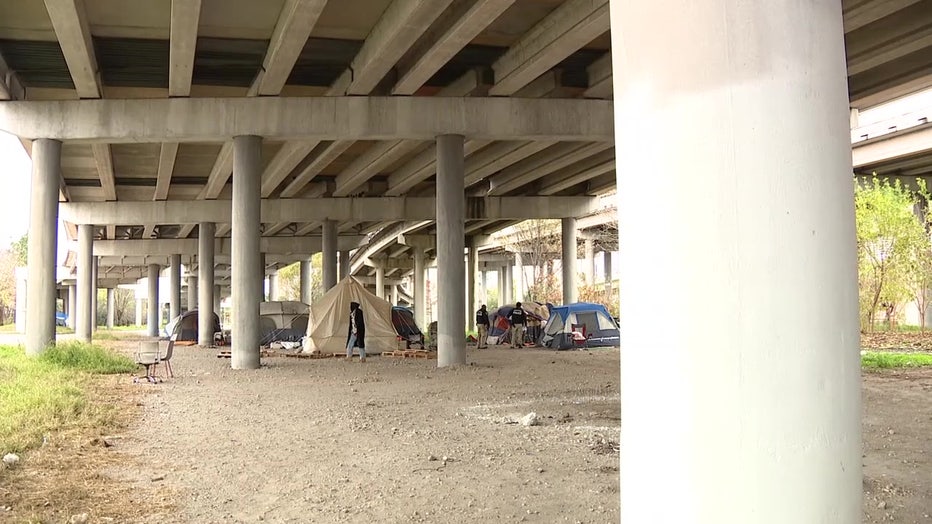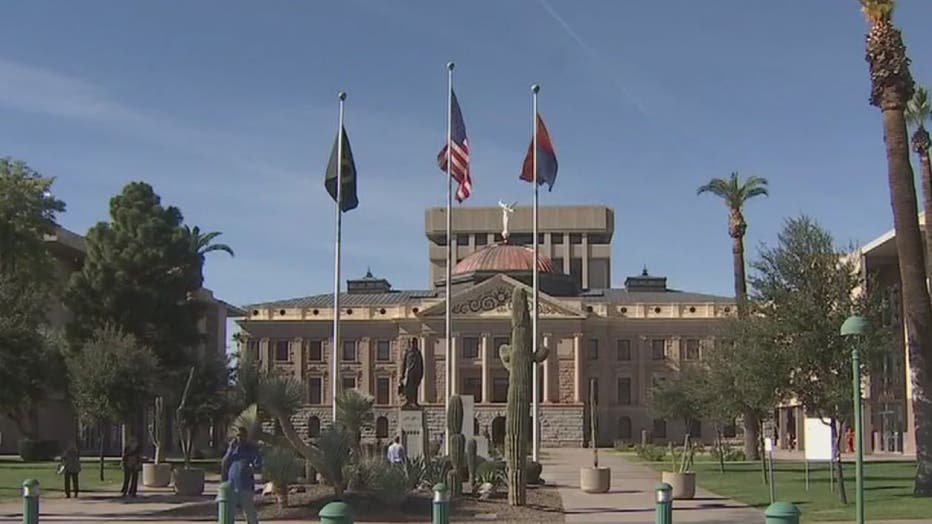'City of a Thousand': Arizona lawmaker pushes for sanctioned camps as 'temporary' solution to homeless crisis

'City of a Thousand': Arizona, Texas proposing different solutions to the homeless crisis
As Phoenix, along with other cities in the U.S., deal with a growing homeless crisis, there are differing approaches on how to fix the problem. In the final part of a four-part series, FOX 10's Justin Lum takes a look at what leaders are doing in one Texas city to address the crisis, and what one politician in Arizona is proposing.
This is the final part of the four-part series "City of a Thousand," which takes a look at homelessness in the Phoenix area. In case you missed it, here are the links to Part 1, Part 2 and Part 3.
PHOENIX - In the past three weeks, we have looked at the problem of homelessness in the Phoenix area.
"The mayor and the governor can’t let this go on. Somebody needs to do something," said Steve Harrison.
"This is nothing more than our throwaway society, only it happens to be human beings," said Greg Doepker.
Now, we shift our focus to whether there will be a long-term solution to such a multilayered issue that impacts not only Phoenix, but major cities across the nation as well.
In Houston, leaders providing ‘the way home’ to the homeless

Ana Rausch is Vice President of Program Operations with the Coalition for Homeless of Houston and Harris County, which leads 100 partners made up of service agencies, non-profits, local governments, and public housing authorities.
In that area, a homeless response system known as ‘The Way Home’ is investing $65 million with American Rescue Plan funds. There is also a statewide camping ban in Texas.
"We didn't put people in hotels, we didn't set up additional shelters," said Rausch. "We just put the bulk of it into housing."
Rausch says more than 8,000 people have been housed since the program's first launch. According to the coalition’s 2022 Homeless Count and Survey Report, the unhoused population in the Houston region is down nearly 21% since October 2020, and fell 63% since 2011.
According to a count on a January night, there were 3,223 people experiencing homelessness across three counties in the Houston area.
"We use ‘Housing First.’ It's a model that takes someone from homelessness and puts them into a permanent home, and then provide services after they move in, because it's -- you know, and I will say that it's a stereotype -- that people that are experiencing homelessness have substance use issues. Yes, there are a lot with severe mental illness, but if you've been living on the streets for a lot of long, long time, there's a lot of trauma," said Rausch.
Recently, Houston Mayor Sylvester Turner announced the start of the program's second phase. The coalition will invest another $100 million, with an aim to house another 7,000 people.
"Phase 2 will enable us to holistically decommission and reduce street homelessness to the lowest level of any major city in the nation," said Mayor Turner.
"When everyone is aligned and making those decisions, you just work together to make sure that the interventions that you put in place are going to address the needs of the community, and not just be temporary band-aids," said Rausch.
In Arizona, politician proposing a ‘temporary fix’

Arizona State Capitol
In Arizona, one politician is also proposing a solution for the homeless crisis.
"It's temporary, emergency housing that we need now," said State Sen. David Livingston (R).
State Sen. Livingston represents the state's 22nd Legislative District, which covers portions of the far northwest Valley, and is a sponsor of SB1581, The bill, as it currently stands, would provide $50 to cities for sanctioned homeless encampments.
"We have not been successful the last few years addressing homelessness," said State Sen. Livingston. "We have to do this a little differently, so this would be that intermediate step I think we’re missing out on."
What State Sen. Livingston is describing are essentially sub-shelters with bathrooms, potable water, and 24-hour security. He says the camp could be a warehouse, large tent structure, or a tiny home site. Non-profits would be involved with street outreach.
The bill is modeled after the Reducing Street Homelessness Act, which is written by a Texas-based think tank called the Cicero Institute. The board’s chairman is Joe Lonsdale, who is a co-founder of Palantir.
Cicero Institute’s model has not only spread to Texas, but it has also been proposed in Georgia, Missouri, Oklahoma, and Wisconsin.
In Arizona, however, there is a clear opposition to sanctioned homeless encampments.
"Ultimately, what we are doing is creating a space where people will die, and we have to be OK with that, or we can work together and create new solutions that are proven beyond just encampments because yes, there's value to them, but they cannot be our answer," said Richard Crews.
When asked whether the bill might be seen as criminalizing the unsheltered, State Sen. Livingston offered this in response.
"So, the League of Cities have had many discussions on that, and that is not the goal," said State Sen. Livingston. "We don't wanna criminalize this, but criminal activity is happening down in ‘The Zone.’ People are being raped. Drugs are happening. People are dying. So we need to provide alternatives, and have the homeless folks choose to get help."
Business owner in ‘The Zone’ sounds off on bill
Angela Ojile, whose design studio is in the heart of ‘The Zone’ near 11th Avenue and Madison, supports SB1581. She says she has been asking the city to do more about the growing encampment, faster.
Ojile shared photos of the homeless crisis' impact on her property: a trashed sidewalk, undergarments hanging on her fence, and that same fence in flames.
"If this was your brother or sister, would you want them out here for a night?" said Ojile.
Maricopa County launching network of resources
On June 1, officials with Maricopa County, along with the Arizona Multi-Housing Association, announced the launch of ‘Threshold,’ which is a network of resources for property owners and managers.
The network's goal is to rent to people transitioning from homelessness to permanent housing, and $5 million will be invested to engage property owners.
Since 2021, Maricopa County has spent nearly $150 million to address homelessness and affordable housing by way of the American Rescue Plan Act.
Other Homeless Crisis Stories
- New 200-bed shelter in Phoenix opens with aim to help the city's homeless during the summer months
- Formerly incarcerated man turns his life around with the help of Phoenix Rescue Mission, Glendale Works
- Homelessness jumps 35% in 2 years in Maricopa County

'City of a Thousand' Part 3: Phoenix councilwoman returns to 'the zone,' optimistic about tackling homeless crisis
A Phoenix city councilwoman joined in on a ride through "the zone," a growing homeless encampment downtown, and for Yassamin Ansari, homelessness has been a key issue for her to address since taking office in District 7.

'City of a Thousand' Part 2: Advocates blame housing crisis, rent hikes for homeless encampment boom
Under-resourced. Under-housed. In part two of a "City of a Thousand," we take a look at the resources, or lack thereof, that homeless advocates believe are leading to the encampment boom in Phoenix.

'City of a Thousand' Part 1: Downtown Phoenix's tent city explodes at alarming rate
Within a pocket of streets and sidewalks in downtown Phoenix, the homeless crisis exploded with more than a thousand unsheltered people living on the streets in this area known as "the zone."

